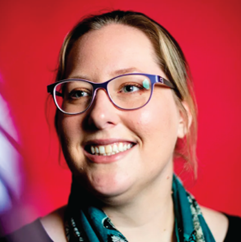Jessica Oakes
Seminar Information

The respiratory system is one of the primary portals into the body and is responsible for gas exchange and protection from airborne foreign substances. The extent of deposition, retention, and clearance of inhaled particles is a complex interaction of physical forces, biological mechanisms, and subject's pathophysiology. Aerosol particles that originate from toxic sources (e.g., wildland fires, cigarettes/e-cigarettes, industrial emissions) can cause local and systemic inflammation, which when exposed to chronically, can lead to dysfunction of nearly every system in the body. Alternatively, particles may be designed for therapeutic purposes to treat, for example, asthma or respiratory distress syndrome. This talk will first focus on development of a chronic exposure platform to model occupation exposure in the context of wildland fire fighters. The resulting changes in pulmonary function following chronic exposure will be discussed. Switching gears, the second half of the talk will highlight the development of physiologically based computational models to estimate and optimize deposited therapeutic dose in asthmatic subjects.
Jessica Oakes joined the Department of Bioengineering as a tenure-track Assistant Professor in 2016. Following completion of her PhD in 2013 (UC San Diego), she continued research in aerosol medicine as a postdoc fellow at INRIA Paris, France and at UC Berkeley, supported by a Whitaker Fellowship, a UC Presidential Postdoc Fellowship, and an American Lung Association Fellowship. Now, her research group focuses on combining experimental and numerical techniques to predict, quantify, and optimize aerosol dosimetry, and the corresponding structure/function response, in the lung. Dr. Oakes’s is the recipient of the Outstanding New Environmental Scientist award from NIH/NIEHS. Her research is also generously supported by the FEMA/DHS Assistance to Firefighters grant program, NIH NHLBI, and the Bill & Melinda Gates Foundation.
